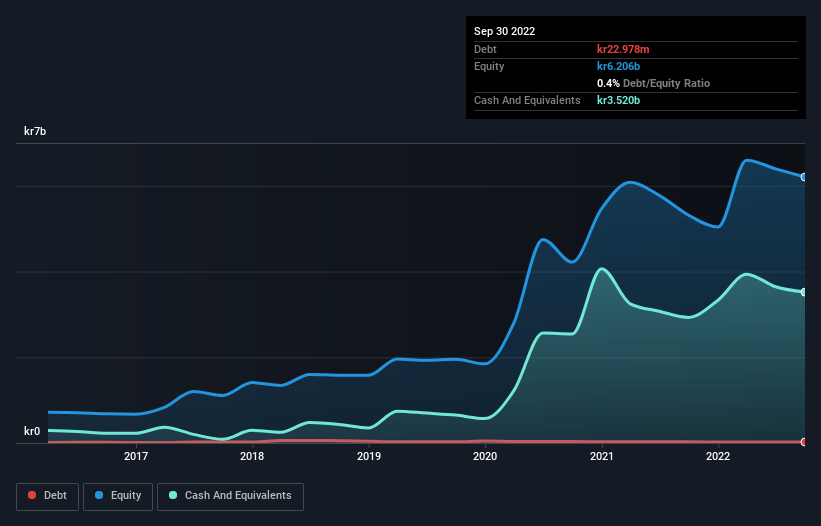
David Iben put it well when he said, 'Volatility is not a risk we care about. What we care about is avoiding the permanent loss of capital.' So it might be obvious that you need to consider debt, when you think about how risky any given stock is, because too much debt can sink a company. We note that Nel ASA (OB:NEL) does have debt on its balance sheet. But the real question is whether this debt is making the company risky.
Why Does Debt Bring Risk?
Debt assists a business until the business has trouble paying it off, either with new capital or with free cash flow. Ultimately, if the company can't fulfill its legal obligations to repay debt, shareholders could walk away with nothing. However, a more frequent (but still costly) occurrence is where a company must issue shares at bargain-basement prices, permanently diluting shareholders, just to shore up its balance sheet. Of course, plenty of companies use debt to fund growth, without any negative consequences. When we think about a company's use of debt, we first look at cash and debt together.
Check out our latest analysis for Nel
What Is Nel's Net Debt?
You can click the graphic below for the historical numbers, but it shows that Nel had kr23.0m of debt in September 2022, down from kr28.1m, one year before. But it also has kr3.52b in cash to offset that, meaning it has kr3.50b net cash.

How Strong Is Nel's Balance Sheet?
We can see from the most recent balance sheet that Nel had liabilities of kr907.9m falling due within a year, and liabilities of kr261.1m due beyond that. Offsetting this, it had kr3.52b in cash and kr351.8m in receivables that were due within 12 months. So it can boast kr2.70b more liquid assets than total liabilities.
This short term liquidity is a sign that Nel could probably pay off its debt with ease, as its balance sheet is far from stretched. Succinctly put, Nel boasts net cash, so it's fair to say it does not have a heavy debt load! There's no doubt that we learn most about debt from the balance sheet. But ultimately the future profitability of the business will decide if Nel can strengthen its balance sheet over time. So if you're focused on the future you can check out this free report showing analyst profit forecasts.
In the last year Nel wasn't profitable at an EBIT level, but managed to grow its revenue by 8.1%, to kr781m. We usually like to see faster growth from unprofitable companies, but each to their own.
So How Risky Is Nel?
Statistically speaking companies that lose money are riskier than those that make money. And we do note that Nel had an earnings before interest and tax (EBIT) loss, over the last year. And over the same period it saw negative free cash outflow of kr876m and booked a kr720m accounting loss. But the saving grace is the kr3.50b on the balance sheet. That means it could keep spending at its current rate for more than two years. Overall, its balance sheet doesn't seem overly risky, at the moment, but we're always cautious until we see the positive free cash flow. There's no doubt that we learn most about debt from the balance sheet. But ultimately, every company can contain risks that exist outside of the balance sheet. Be aware that Nel is showing 2 warning signs in our investment analysis , you should know about...
When all is said and done, sometimes its easier to focus on companies that don't even need debt. Readers can access a list of growth stocks with zero net debt 100% free, right now.
Valuation is complex, but we're here to simplify it.
Discover if Nel might be undervalued or overvalued with our detailed analysis, featuring fair value estimates, potential risks, dividends, insider trades, and its financial condition.
Access Free AnalysisHave feedback on this article? Concerned about the content? Get in touch with us directly. Alternatively, email editorial-team (at) simplywallst.com.
This article by Simply Wall St is general in nature. We provide commentary based on historical data and analyst forecasts only using an unbiased methodology and our articles are not intended to be financial advice. It does not constitute a recommendation to buy or sell any stock, and does not take account of your objectives, or your financial situation. We aim to bring you long-term focused analysis driven by fundamental data. Note that our analysis may not factor in the latest price-sensitive company announcements or qualitative material. Simply Wall St has no position in any stocks mentioned.
About OB:NEL
Nel
A hydrogen company, provides solutions to produce, store, and distribute hydrogen from renewable energy in Norway and internationally.
Flawless balance sheet with limited growth.
Similar Companies
Market Insights
Community Narratives




